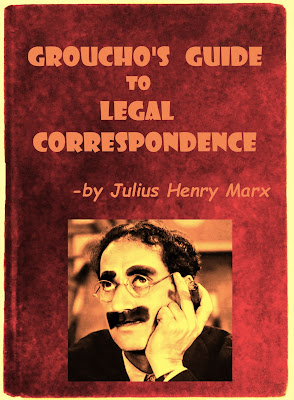As the Marx Brothers were planning to make a movie called A Night in Casablanca, Warner Brothers Pictures threatened legal action because they had made Casablanca five years before. Here are excerpts from some actual letters Groucho sent to the Warner Bros. legal department:
Dear Warner Brothers:
...up to the time we contemplated making this picture, I had no idea that the city of Casablanca belonged exclusively to Warner Brothers...It seems that in 1471, Ferdinand Balboa Warner, your great-great-grandfather, while looking for a shortcut to the city of Burbank, stumbled on the shores of Africa and...named it Casablanca...You claim you own Casablanca and that no one else can use that name without your permission. What about "Warner Brothers"? Do you own that, too? You probably have the right to use the name Warner, but what about Brothers? Professionally, we were brothers long before you were...
Sincerely, Groucho Marx
His letter, of course, confused the Warner Brothers' legal department. They sent a letter with a serious request for a plot outline (like there's ever much of a "plot" in Marx Bros. movies!). Groucho wrote back with a wildly fictitious outline. Being even more confused (and lacking any sense of humor!), the lawyers wrote again, saying they still didn't understand the story line and would appreciate Groucho sending a detailed story line. Here are excerpts from his third letter:
Dear Brothers:
Since I last wrote you, I regret to say there have been some changes in the plot our our new picture...I play Bordello, the sweetheart of Humphrey Bogart. Harpo and Chico are itinerant rug peddlers who are weary of laying rugs and enter a monastery just for a lark. This is a good joke on them, as there has not been a lark in the place for fifteen years...In the fifth reel, Gladstone* makes a speech that sets the House of Commons in an uproar, and the King promptly asks for his resignation...Humphrey Bogart's girl, Bordello, spends her last years in a Bacall house. This, as you can see, is a very skimpy outline. The only thing that can save us from extinction is a continuation of the film shortage.
Fondly, Groucho Marx
Dear Warner Brothers:
...up to the time we contemplated making this picture, I had no idea that the city of Casablanca belonged exclusively to Warner Brothers...It seems that in 1471, Ferdinand Balboa Warner, your great-great-grandfather, while looking for a shortcut to the city of Burbank, stumbled on the shores of Africa and...named it Casablanca...You claim you own Casablanca and that no one else can use that name without your permission. What about "Warner Brothers"? Do you own that, too? You probably have the right to use the name Warner, but what about Brothers? Professionally, we were brothers long before you were...
Sincerely, Groucho Marx
His letter, of course, confused the Warner Brothers' legal department. They sent a letter with a serious request for a plot outline (like there's ever much of a "plot" in Marx Bros. movies!). Groucho wrote back with a wildly fictitious outline. Being even more confused (and lacking any sense of humor!), the lawyers wrote again, saying they still didn't understand the story line and would appreciate Groucho sending a detailed story line. Here are excerpts from his third letter:
Dear Brothers:
Since I last wrote you, I regret to say there have been some changes in the plot our our new picture...I play Bordello, the sweetheart of Humphrey Bogart. Harpo and Chico are itinerant rug peddlers who are weary of laying rugs and enter a monastery just for a lark. This is a good joke on them, as there has not been a lark in the place for fifteen years...In the fifth reel, Gladstone* makes a speech that sets the House of Commons in an uproar, and the King promptly asks for his resignation...Humphrey Bogart's girl, Bordello, spends her last years in a Bacall house. This, as you can see, is a very skimpy outline. The only thing that can save us from extinction is a continuation of the film shortage.
Fondly, Groucho Marx
There were no more letters after this.
*William Gladstone was prime minister four times in the latter part of the 19th century, under Queen Victoria's rule and was the dominant voice of the Liberal Party. He made several rousing speeches in this capacity.

